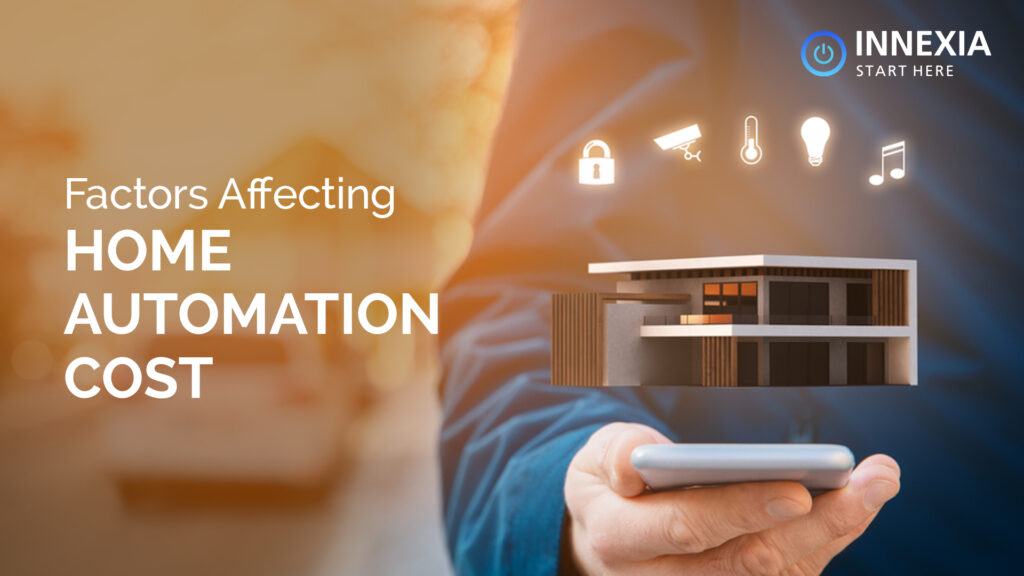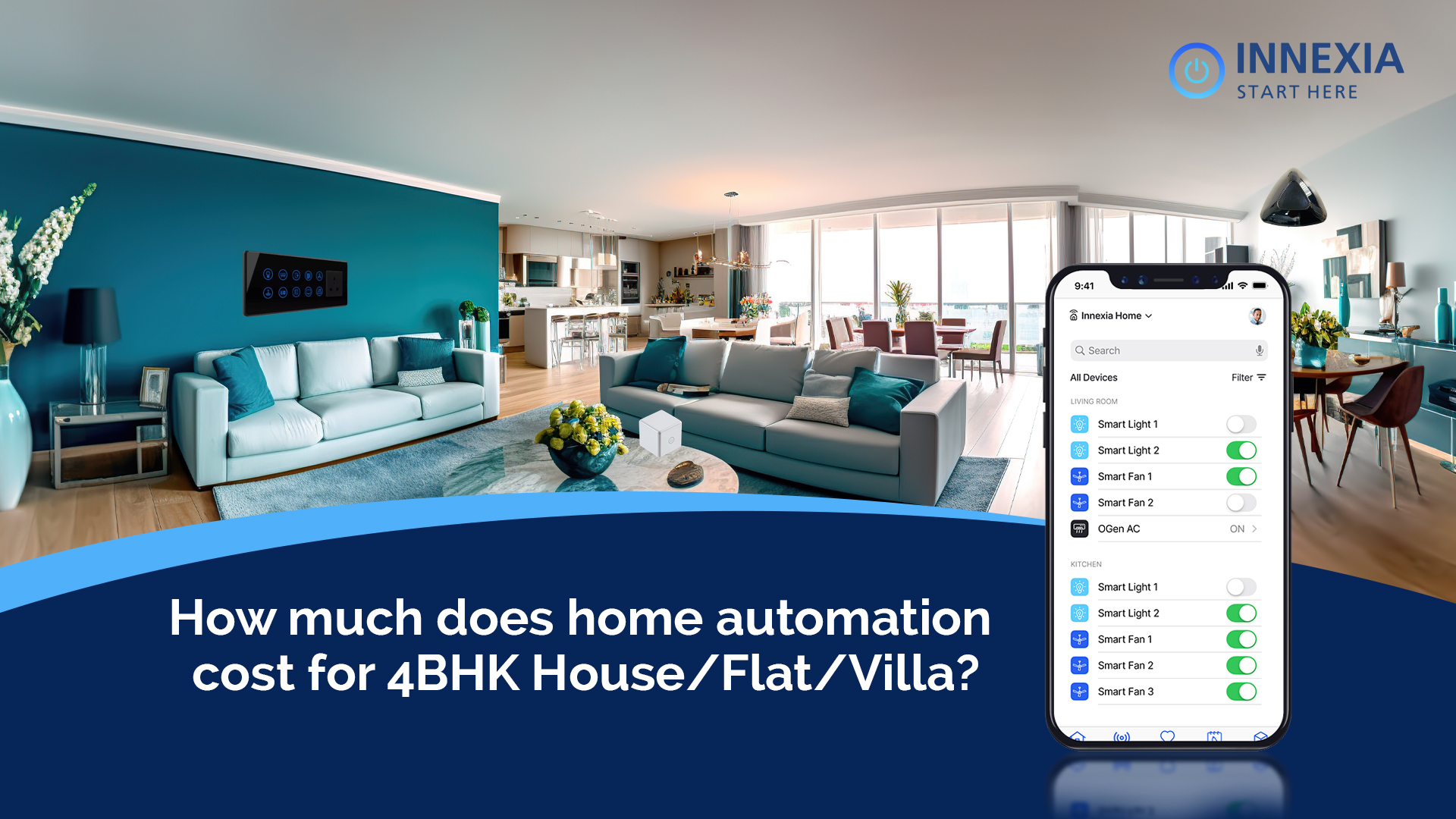Smart Home automation the integration of technology to control and automate home systems, has transformed the way we live. From lighting and security to climate control and entertainment, smart homes offer convenience, comfort, and energy efficiency.
By automating various aspects of your home, you can enhance your lifestyle, increase security, and potentially reduce energy consumption.
Understanding the costs involved in automating a home is crucial for making informed decisions. This article focuses on the expenses associated with home automation for a 4BHK house, flat, or villa.
Factors Affecting Home Automation Cost

The cost of Home Automation Company for a 4BHK residence is influenced by several factors:
1. Scope of Automation
The extent of automation desired significantly impacts the overall cost.
- Focus on essential functions like lighting and security, offering a more affordable option.
- Include a wider range of features such as climate control, entertainment, and smart appliances, resulting in higher costs.
- Allows for gradual expansion, starting with core functionalities and adding features as budget permits.
- Tailored automation solutions to specific needs can influence costs, as they may require specialized equipment or programming.
2. Type of Devices
The choice of devices can drastically affect the budget.
- Deliver exceptional performance and advanced capabilities at a premium cost.
- Provide basic functionality at a lower cost, suitable for those on a tight budget.
- Well-known brands often command a premium price, while lesser-known brands may offer cost-effective alternatives.
- Ensure devices are compatible with your chosen smart home ecosystem to avoid additional costs.
3. Installation Complexity
The complexity of your home’s infrastructure affects installation costs.
- Older homes may require more extensive wiring, increasing expenses.
- DIY installations can save on labour costs, but professional expertise ensures optimal setup.
- Ensures proper setup, troubleshooting, and potential warranty coverage, but incurs labor charges.
- Unexpected challenges like wall openings or cable runs can increase installation time and expenses.
4. Additional Features
Incorporating advanced features can increase the overall cost.
- Enables hands-free operation but requires compatible devices and systems.
- Serve as central control points but add to the initial investment.
- Offers intelligent automation but comes with higher technological requirements.
Cost Estimates
Installing a Home Automation System can significantly enhance your lifestyle, but costs can vary widely. To maximize your budget, consider these practical strategies:
1. General Cost Ranges
Providing exact figures for home automation costs is challenging due to the wide range of factors involved.
- Focusing on essential features like lighting and security typically range from ₹50,000 to ₹2,00,000.
- Incorporating climate control, entertainment, and additional devices can cost between ₹2,00,000 and ₹5,00,000.
- Featuring advanced features, luxury brands, and extensive automation can exceed ₹5,00,000.
3. Cost-Saving Tips
To enhance your budget’s effectiveness, explore these options:
- Begin with a basic system and gradually expand as needed.
- If you possess technical skills, consider installing the system yourself to save on labor costs.
- Look for discounts, bundle offers, or seasonal sales on smart home devices.
- Obtain estimates from multiple vendors to identify the most competitive pricing.
Additional Considerations
When planning your Smart Home, it’s essential to consider factors beyond the initial investment.
1. Future-Proofing Your System
To ensure your system remains relevant and efficient, it’s crucial to consider future compatibility.
- Opt for devices and systems that adhere to widely accepted standards to facilitate integration.
- Modular systems allow for easier upgrades and replacements as technology advances.
- SRegularly check for system updates and new compatible devices to maintain optimal performance.
2. Understanding Maintenance Costs
While automation brings convenience, it also requires ongoing care.
- Keep your system’s software up-to-date to address vulnerabilities and improve functionality.
- Periodic checks and cleaning of devices can prevent malfunctions.
- Consider professional maintenance plans for comprehensive care.
3. Maximizing Energy Efficiency
We offers significant potential for energy savings.
- Optimize temperature control according to occupancy and climate
- Reduce energy consumption by adjusting lights based on natural light and occupancy.
- Monitor energy use to find ways to improve efficiency and save money.
Conclusion
Innexia offers enhanced comfort, security, and energy efficiency. While initial costs vary, long-term benefits are substantial. Consider factors like energy efficiency, scalability, and compatibility. Zigbee Technologies can optimize your network. By careful planning, you can create a smart home that aligns with your lifestyle and budget.
FAQ – Home Automation Company
A: Innexia smart home automation systems prioritize security, but vigilance is key. We recommend choosing reputable Smart Home Automation Companies and employing robust security measures. Use strong, unique passwords for each device and regularly update software. Consider additional security layers like firewalls and network monitoring for comprehensive protection.
A: Home automation systems can significantly boost your home’s value by offering modern conveniences and enhanced security. Potential buyers often see smart homes as desirable and may be willing to pay a premium for properties equipped with these features. Energy-efficient smart home systems can also appeal to environmentally conscious buyers, further increasing your home’s market value.
A: Several protocols facilitate communication between home automation devices. Zigbee is renowned for its low power consumption and reliability, making it suitable for battery-powered devices. Z-Wave offers robust security and extended range, often preferred for larger homes. While Wi-Fi is widely accessible, its reliability for real-time control can be inconsistent. Bluetooth, ideal for short-range connections, finds application in specific devices.



